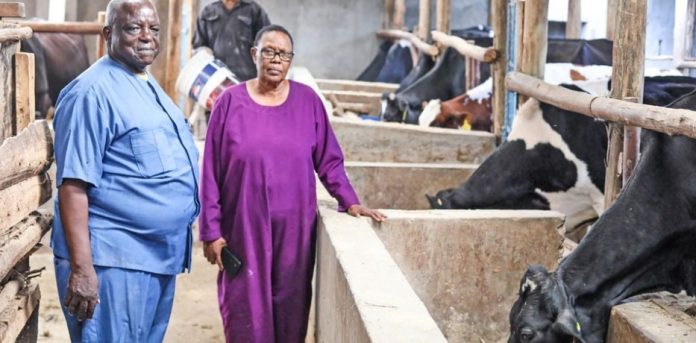Joska, in Machakos County, is rapidly growing as investors rush to purchase land due to its affordability and proximity to the Nairobi Central District (CBD).
While land is considered cheap in the area, it is not as cheap as it was about 2 decades ago, when Nemuel (now 75) and his wife Nyaboke Mbicha (71) purchased their 5 acres of land.
Nemuel, a former children’s officer at the office of the former vice president George Saitoti, and Nyaboke, a former secretary for various government agencies, wanted to venture into farming after retirement.
To actualize their dream, the two invested their savings in purchasing 5 acres of land in Joska, with an acre going for Sh80,000. At the time, the area was a wasteland characterized by water scarcity and wild animals.
“It was bare, bushy, and full of snakes, hyenas, and even zebras,” recalled Mr. Mbicha.
Today, the two have turned the land into a profitable farm with dairy cows, chickens, and ducks. The two started farming in 2007 with Sh490,000, which they invested in dairy farming.
Peter Mwaka: Pixie farmer making more money than his combined 37-year salary
They acquired six Friesian calves and invested the surplus in building cowsheds. Unfortunately, all six calves died of East Coast fever, leaving them with losses.
Giving up was not an option for the Mbichas, who invested in more livestock, streamlined operations, and soon the farm became profitable.
Mrs. Mbicha began supplying milk from the farm to her colleagues and government offices. So profitable was the venture that she retired early at 46 to fully focus on agribusiness.
Today, the farm is home to 40 cows, including 20 productive dairy cows which produce 250-300 liters of milk daily.
The milk is sold to New Kenya Cooperative Creameries (New KCC) at Sh50 per liter, translating to a monthly income of between Sh375,000 to Sh450,000.
To cut on feeding costs, the couple grows their fodder on an additional four-acre plot near Athi River. They harvest, chop, and store the feed as hay and silage.
They have also invested in irrigation systems that supply solar-pumped borehole water, ensuring a constant water supply.
Besides cows, the Mbichas’ farm also hosts goats, chickens, ducks, and turkeys. The couple uses cattle waste to generate biogas, which is used to power their kitchen.
“My call to young people is that they should begin preparing for retirement during their youth. Reinvesting profits into a venture is key to growth and success,” Mr. Mbicha said.









